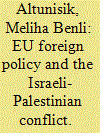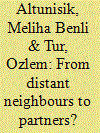| Srl | Item |
| 1 |
ID:
085463


|
|
|
|
|
| Publication |
2008.
|
| Summary/Abstract |
This article aims to analyse the EU's evolving involvement in the management and resolution of the Israeli-Palestinian conflict. By using the framework of EU 'actorness', it argues that the EU has had the 'opportunity, presence and capabilities' to be an actor in the conflict. Developments in the international and EU contexts, as well as in the conflict itself, both allowed, and at times forced the EU to be more active. As a result the EU has become a more important actor in the conflict space. Yet this occurred at the expense of the EU's decreasing distinctiveness as an actor.
|
|
|
|
|
|
|
|
|
|
|
|
|
|
|
|
| 2 |
ID:
072547


|
|
|
|
|
| Publication |
2006.
|
| Summary/Abstract |
The growth of cooperative relations between Syria and Turkey, after the two countries came to the brink of war in 1998, has been a major development in the Middle East. This article examines both the reasons behind increasing ties between the two countries and the new challenges this rapprochement is facing due to the rapidly shifting international context. It argues that although systemic factors have been crucial in setting up the parameters of the bilateral relationship, these factors gain meaning through the complexities of domestic settings. The US policy of regime change and the Iraq War of 2003 and its aftermath are taken as the main regional and international factors influencing relations between the two countries since 1998. Domestic factors like the process of regime consolidation in Syria under Bashar and rising nationalism, the Kurdish issue, and the coming to power of the Justice and Development Party in Turkey constitute the main lenses through which these systemic factors are evaluated and policy outcomes projected.
|
|
|
|
|
|
|
|
|
|
|
|
|
|
|
|
| 3 |
ID:
190816


|
|
|
|
|
| Summary/Abstract |
This article explores the general characteristics of Turkey’s foreign policy in long durée by introducing the concept of a modified middle power. It argues that its historical legacy, the ambiguity of its regional belonging, and its real and constructed pivotal geography have modified Turkey’s ‘middlepowerness’ and led to its in-betweenness. As such, the Turkish Republic, in its 100 years of history, has developed different strategies that aim to both remedy and sustain this in-betweenness. It is argued that this characteristic has been Turkey’s contribution to global politics. Yet, during the AKP rule, especially since the 2010s, Turkey’s in-betweenness has been undermined, ultimately weakening Turkey’s position and role.
|
|
|
|
|
|
|
|
|
|
|
|
|
|
|
|